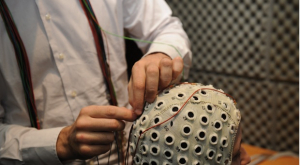The inner world of overactive monitoring: neural markers of interoception in obsessive-compulsive disorder
Psychological Medicine
Yoris, A., García, A. M., Traiber, L., Santamaría-García, H., Martorell, M., Alifano, F., Kichic, R., Moser, J., Cetkovich, M., Manes, F., Ibáñez, A. & Sedeño, L. (2017). The inner world of overactive monitoring: neural markers of interoception in obsessive-compulsive disorder. Psychological Medicine 4, 1-14. Online: http://bit.ly/2oqdisV.
Los pacientes con trastorno obsesivo-compulsivo (TOC) tienden a controlar excesivamente su propio comportamiento. Sin embargo ningún estudio ha explorado si ello ocurre además en el monitoreo de las señales internas. En este estudio encontramos que estos pacientes superaron a los controles y a pacientes con pánico en una tarea de interocepción cardíaca (que mide la detección de los propios latidos cardíacos). Además, los pacientes con TOC presentaron una mayor modulación cerebral de la interocepción cardíaca. Los resultados muestran que el control hiperactivo en TOC se extiende a la detección de señales internas y sus correlatos cerebrales.
Para acceder al artículo hacé click AQUÍ
The inner world of overactive monitoring: neural markers of interoception in obsessive-compulsive disorder
Psychological Medicine
Yoris, A., García, A. M., Traiber, L., Santamaría-García, H., Martorell, M., Alifano, F., Kichic, R., Moser, J., Cetkovich, M., Manes, F., Ibáñez, A. & Sedeño, L. (2017). The inner world of overactive monitoring: neural markers of interoception in obsessive-compulsive disorder. Psychological Medicine 4, 1-14. Online: http://bit.ly/2oqdisV.
Obsessive–compulsive disorder (OCD) patients typically overmonitor their own behavior, as shown by symptoms of excessive doubt and checking. Although this is well established for the patients’ relationship with external stimuli in the environment, no study has explored their monitoring of internal body signals, a process known to be affected in anxiety-related syndromes. Here, we explored this issue through a cardiac interoception task that measures sensing of heartbeats. Our aim was to explore key behavioral and electrophysiological aspects of internal-cue monitoring in OCD, while examining their potential distinctiveness in this condition.
To access the full paper please click here



